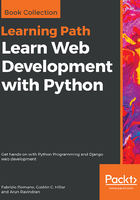
Iterators terminating on the shortest input sequence
This category is very interesting. It allows you to create an iterator based on multiple iterators, combining their values according to some logic. The key point here is that among those iterators, in case any of them are shorter than the rest, the resulting iterator won't break, it will simply stop as soon as the shortest iterator is exhausted. This is very theoretical, I know, so let me give you an example using compress. This iterator gives you back the data according to a corresponding item in a selector being True or False:
compress('ABC', (1, 0, 1)) would give back 'A' and 'C', because they correspond to 1. Let's see a simple example:
# compress.py
from itertools import compress
data = range(10)
even_selector = [1, 0] * 10
odd_selector = [0, 1] * 10
even_numbers = list(compress(data, even_selector))
odd_numbers = list(compress(data, odd_selector))
print(odd_selector)
print(list(data))
print(even_numbers)
print(odd_numbers)
Notice that odd_selector and even_selector are 20 elements long, while data is just 10 elements long. compress will stop as soon as data has yielded its last element. Running this code produces the following:
$ python compress.py
[0, 1, 0, 1, 0, 1, 0, 1, 0, 1, 0, 1, 0, 1, 0, 1, 0, 1, 0, 1]
[0, 1, 2, 3, 4, 5, 6, 7, 8, 9]
[0, 2, 4, 6, 8]
[1, 3, 5, 7, 9]
It's a very fast and nice way of selecting elements out of an iterable. The code is very simple, just notice that instead of using a for loop to iterate over each value that is given back by the compress calls, we used list(), which does the same, but instead of executing a body of instructions, puts all the values into a list and returns it.